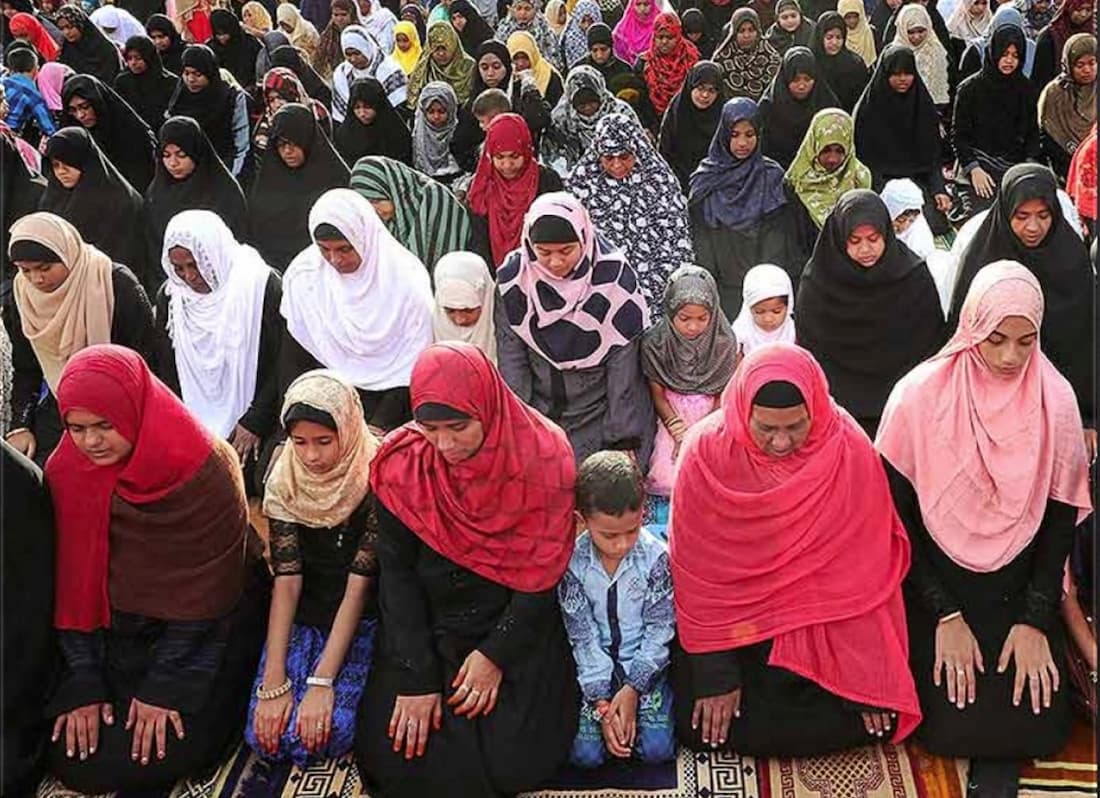Laylatul-Qadr and I‘tikāf ?
Why The Night of Power? | Laylat-ul-Qadr | I‘tikāf-Striving to perform as many acts of worship as possible during the last ten days – An important sunnah of the Prophet is an increased effort in worship throughout the last ten days and nights of Ramadhān. He would spend the nights in prayer, recitation of the Qur’ān and supplication. ‘Ā’ishah reported that during the last ten days of Ramadhān, the Messenger of Allah would wake his wives up during the night and then remain apart from them. (Al-Bukhāri and Muslim) It meant that he would be occupied with worship. And ʽAlī added, “He would strive [in worship] during the last ten days of Ramadhān more than at any other time.” (Muslim and at-Tirmidhi)
Acts of worship are numerous and diverse, and within the vast range of righteous deeds one may find ways and methods that are compatible with the needs of his society and with his own inclinations to serve. No specific manner of worship is preferred for everyone. One kind might be better in the case of a given individual while another might be better for someone else, according to the abilities of each and the degree that it brings him closer to Allah.
The practice of the Prophet’s companions in Ramadhān:
The practice of the Prophet’s companions in Ramadhān was to observe days of activity, production and good deeds, nights of prayer, supplication and recitation of the Qur’ān. For them, Ramadhān was a month of obedience, righteousness and learning, of avoiding sin and seeking forgiveness from Allah. They performed additional acts of worship, especially during the last ten nights. They had simple meals and made great efforts to help the needy and the poor. They visited relatives, the ill and the distressed and they practiced patience and caution in speech, with tongues fasting from gossip and dispute, thanking and praising Allah, advising and comforting others.
This is the Prophet’s sunnah for the month of Ramadhān: increased worship, generosity, kindness and good work of every kind. It provides the ideal pattern for life throughout the year and the fulfillment of the purpose of man’s creation, which is to continuously worship Allah as well as possible.
Seeking Laylatul-Qadr:

Laylatul-Qadr-The Night of Power? – (The night of measured portions [of Allah’s decree], which are destined for the coming year.)is the most excellent and blessed night of the year. On this night, the most important event in human history took place. By the Creator’s command, His words (the Qur’ān) were sent down to the nearest heaven to be conveyed by the angel Jibreel to Prophet Muḥammad . Allah confirmed:
Indeed, We sent it [i.e., the Qur’ān] down during Laylatul-Qadr. And what can make you know what is Laylatul-Qadr? Laylatul-Qadr is better than a thousand months.
Scholars have explained that any act of worship done during that night is better than the same one done for a thousand months of ordinary nights.
(A thousand months is equal to 83.33 years, or the average lifetime of a human being.)
The Prophet said, “Whoever spends Laylatul-Qadr in prayer with faith and seeking reward will have whatever preceded of his sin forgiven.” (Al-Bukhāri and Muslim) He would seek its blessings during the last ten nights of Ramadhān, and said, “Look for it in the odd nights of the last ten.” Throughout these nights he would worship until fajr, avoid marital relations and awaken his family for prayer.
There has been much speculation about which night is Laylatul-Qadr. Some scholars assert that it is the eve of the 27th, as it is mentioned in a ḥadith narrated by Muslim, while the 23rd, 25th and 29th are mentioned in other ḥadiths. (Those who believe it is the eve of the 27th quote from Ubayy bin Ka‘b: “It is the night Allah’s Messenger ( ) ordered us to spend in prayer. It is the eve of the 27th of Ramadhān. Its sign is that the sun will rise the morning of that day white without rays.” (Related by Aḥmad and Muslim) However, this is a statement of one companion exercising his judgment (ijtihād). The majority of scholars are of the opinion that the night is not known for certain. It is possible that it may change from year to year, so it could fall on the eve of the 21st, 23rd, 25th, 27th or 29th. But Allah knows best. ) However, Allah did not reveal the precise date to His Messenger , who only said: “Seek it in the last ten nights, in the odd nights.” (Al-Bukhāri and Muslim) Perhaps the wisdom behind it is to allow people to benefit fully from all of the ten nights when following the Prophet’s sunnah.
One should spend these nights as much as possible in prayer, supplication, recitation of the Qur’ān and remembrance of Allah. ‘A’ishah inquired, “O Messenger of Allah, if I should know which night is Laylatul-Qadr, what should I say therein?” He replied, “Say: ‘Allāhumma innaka ‘afuwwun tuḥibbul-‘afwa fa‘fu ‘anni.’” (O Allah, You are forgiving and love forgiveness, so forgive me). (At-Tirmidhi and Ibn Mājah – ṣaḥeeḥ)
I‘tikāf;
I‘tikāf means to observe a retreat in the masjid. I’tikāf is valid in any masjid in which prayers are held in congregation. It is an act of worship prescribed in Ramadhān and at other times. But observing it in Ramadhān is better than at other times. It is a means for the worshiper to purify his heart and turn wholly and exclusively to his Lord. His ordinary activities are greatly reduced and he is freed briefly from worldly obligations such as those toward his family members.
The Prophet used to observe i‘tikāf during the last ten days of Ramadhān until Allah took his soul, and then his wives observed it after that. (Al-Bukhāri and Muslim) The basic objective of the Prophet’s i‘tikāf was to seek and benefit from Laylatul-Qadr because of the great merit of that night.
I‘tikāf is a sunnah practice for both men and women, and the wives of the Prophet ( ) used to observe it with him in the masjid during his lifetime and continued to do it after he passed away. A condition of i‘tikāf is that it must be observed in the masjid, ( It is not valid for women to observe i‘tikāf at home, for if it was permissible, the Prophet’s wives would have done. it at least once to demonstrate that, and the Prophet would have encouraged them to do so, since generally, it is preferable for a woman to worship in her house than in the masjid.) and a person observing it may not leave the masjid. (Leaving the masjid means to depart with one’s entire body.) It is agreed by all Muslim scholars that leaving the masjid unnecessarily nullifies i‘tikāf, while leaving it out of necessity does not.
For example, it is permissible for a person in i‘tikāf to leave the masjid in order to relieve himself and perform required acts of purification for prayer: wudhū’ and ghusl. If needed, it is permissible to leave the masjid in order to eat and drink, but if it is possible to have food and drink brought to him he is required to remain in the masjid. If an illness is severe enough to require someone to seek treatment, it is permissible for him to leave for this purpose and return, and it will not nullify his i‘tikāf. One may also leave to attend the Jumu‘ah prayer if the masjid in which he is observing i‘tikāf does not hold Jumu‘ah prayers.
However, leaving in order to visit someone who is sick or to attend a funeral prayer is another matter. The majority of scholars hold the view that it is not permissible for a person to leave for these reasons based on the practice of the Prophet. (Shaykh Muhammad bin Ṣāliḥ al-‘Uthaymeen added: “It is permissible for a person observing i‘tikāf to make and receive phone calls when necessary to fulfill the needs of Muslims if the phone is present in the masjid. But he may not leave the masjid in order to use the phone. If he has specific duties towards others that prevents him from remaining in the masjid, he should not be observing i‘tikāf in the first place, because fulfilling the needs of Muslims is more important than observing a retreat in the masjid. Generally, that which provides benefit to others is superior to that which provides a benefit only to the self.”)
With regard to the duration of i‘tikāf, the majority of scholars hold the view that there is no specified extent of time. Any time spent in the masjid longer than the usual period with the intention of observing i‘tikāf is considered as a valid i‘tikāf, even if it is only for an hour of the day. One who is unable to observe i‘tikāf for the entire period may do whatever he can.
![Write detail about Laylatul-Qadr and I‘tikāf ? i‘tikāf benefits, Laylatul-Qadr hadith, Indeed login, preferable sentence, masjid design and quranmualim. Learn Quran, Quran translation, Quran mp3,quran explorer, Quran download, Quran translation in Urdu English to Arabic, almualim, quranmualim, Islam pictures, Islam symbol, Shia Islam, Sunni Islam, Islam facts],Islam beliefs and practices Islam religion history, Islam guide, prophet Muhammad quotes, prophet Muhammad biography, Prophet Muhammad family tree.](https://www.quranmualim.com/wp-content/uploads/2019/05/Write-detail-about-Laylatul-Qadr-and-I‘tikāf-C.jpg)
https://youtu.be/f6b0mhjmDoE







